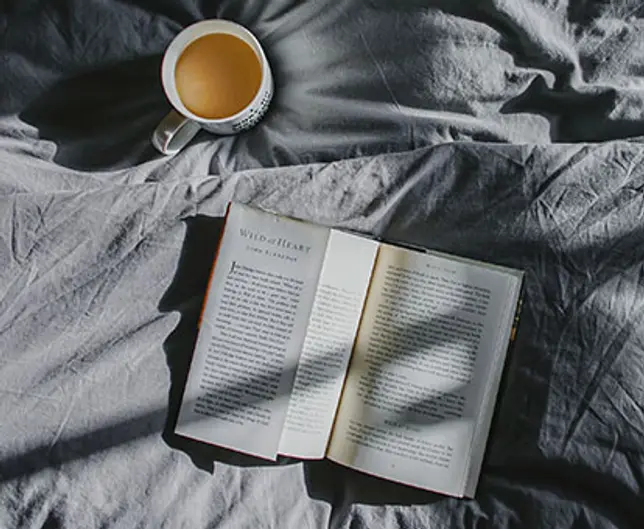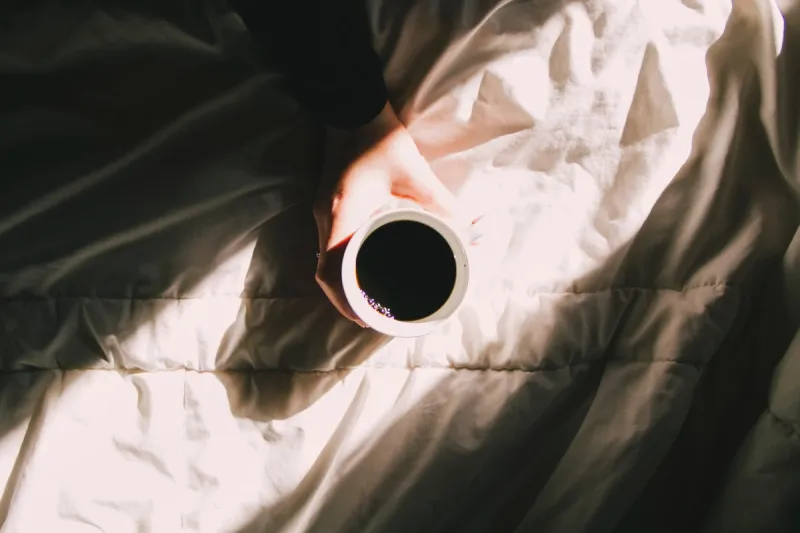Coffee and Sleep

The caffeine found in coffee can negatively affect your sleep. Here's what to keep in mind.
Suitable coffees
Decaf and Sleep
Naturally, you fall asleep in the evening and wake up in the morning. Your body and mind are rested, having had their break to recharge. If your natural sleep-wake rhythm is disrupted, your body reacts with decreased concentration and reduced mental performance. Poor sleep leads to drinking more coffee to counteract the signs of fatigue. But in the evening, the consequences follow. Even though you're tired, sleep evades you. This could be due to the caffeine in coffee. By drinking decaffeinated coffee and going to bed earlier, you support your caffeine-conscious, mindful lifestyle. Healthy sleep, physical activity, and a balanced diet are the cornerstones of a fit body and a sharp mind.

What is Healthy, Restorative Sleep?
Sleep is essential and a key requirement for your health and performance. Healthy sleep is linked to the natural day-night rhythm. After a healthy, restorative sleep, you feel fit, rested, and capable in the morning. Your sleep duration is individual. Some people manage with six hours of sleep per night, while others need nine hours. But all of us go through multiple sleep cycles per night. You can imagine these sleep cycles like a staircase, which you ascend and descend several times during the night. During sleep, light and deep sleep phases alternate gradually. If you stumble on a step, you fall out of rhythm, and it takes time to get back on track. The same happens with sleep phases. If they are disrupted, the sleep cycle goes off beat, and you feel tired and sluggish in the morning. If sleep is consistently disturbed over an extended period, it causes stress, and your health suffers. There are many factors that can influence sleep, and caffeine is one of them.
How Does Caffeine Affect Sleep?
Caffeine can become a stumbling block for your sleep. Research describes the negative effects of acute caffeine consumption on sleep as follows: You may have trouble falling asleep, your sleep duration shortens, your sleep phases change, and your sleep quality suffers. The effects of caffeine on sleep are relevant to all of us, as caffeine is a psychoactive stimulant most commonly consumed through coffee, tea, or soda, almost daily, for a lifetime. Even the chocolate you eat in the evening contributes to the caffeine intake and suppresses fatigue. It is well known that caffeine promotes wakefulness by acting on the Adenosine A1 and A2A receptors in the brain. Adenosine is a neuromodulator responsible for the "tired" signal in the brain. It binds to specific receptors, slowing down the transmission of impulses and promoting sleep. Caffeine resembles adenosine in chemical structure and binds to the same receptors in the brain. As a result, the "tired" signal is blocked, and you stay awake longer. Caffeine's full effect kicks in about 45 minutes after consumption. The body metabolizes caffeine within about 2-5 hours, and its effect on the brain diminishes.
Caffeine addresses the symptom of drowsiness but can also lead to long-term fatigue and drowsiness by disrupting sleep patterns. While sleep disturbances are common in the general population and pose an increased risk for negative medical and psychiatric consequences, most adults try to solve their sleep issues without medication. Behavioral recommendations to promote healthy sleep (sleep hygiene advice) also include avoiding caffeine. So far, very little is known about the extent to which changing caffeine consumption improves sleep. The reality is that some people can drink a double espresso after dinner and fall asleep half an hour later, while others need to be careful with caffeine intake as they experience trouble falling asleep when they have coffee in the afternoon or evening. The body's caffeine-induced reaction to the sleep-wake cycle is very individual.

When Should You Avoid Caffeine to Sleep Well?
The timing of your last caffeine intake is important for your personal sleep quality. Depending on how well your body metabolizes caffeine, you may be affected by potential sleep disruptions. The half-life of caffeine in the blood for a healthy adult is between 2 and 5 hours. The half-life is the time the body takes to reduce half of the consumed caffeine dose. Depending on your metabolism, cycle, diet, or lifestyle, you can influence how quickly your body processes caffeine. The faster the caffeine leaves your system before bedtime, the better you'll sleep. Several studies show that a morning cup of coffee generally doesn't affect sleep the following night. On the other hand, observations from various studies suggest that caffeine-sensitive individuals are more likely to experience sleep disturbances, even if caffeine is consumed early in the day. Another study indicates that 400 mg of caffeine consumed 18 minutes to 6 hours before bedtime significantly disrupts sleep. Even after 6 hours, caffeine reduced sleep by more than 1 hour. This level of sleep loss, if it occurs over several nights, can lead to concentration problems and performance deficits. The study suggests limiting afternoon coffee consumption to before 5:00 p.m. Based on these studies, switching to decaffeinated coffee in the afternoon is recommended if you want to improve your sleep routine.
Drinking coffee in the evening can shift your natural day-night sense and internal clock. The caffeine in coffee can block the production of the hormone melatonin. This delay in melatonin secretion can disturb sleep. Melatonin is primarily produced by the pineal gland in the brain when it gets dark. Melatonin signals the body "it's dark" and helps regulate the timing and length of the night. Throughout the night, melatonin secretion increases, peaking between 2 and 4 a.m., and then gradually decreases. Light inhibits melatonin synthesis and helps regulate our sleep-wake cycle.
Who Is Affected by Caffeine-Induced Sleep Disorders?
Good sleep is important. Poor sleep or sleep disorders have many causes. Too much stress, personal issues, illnesses, fatty foods, or coffee can rob you of sleep. Persistent poor sleep can have significant effects on the entire body, including:
- Weakened immune system
- Overweight
- Cardiovascular diseases
- Diabetes
- Mental health issues such as depression and anxiety disorders
A caffeine-conscious, mindful lifestyle can improve your sleep. However, there are various factors that may contribute to sleep disturbances after caffeine consumption. Studies show that age plays a crucial role in the relationship between caffeine consumption and sleep. Sleep becomes more sensitive as we age. In studies, older adults' sleep was more easily disrupted by caffeine than younger individuals. Not only does age matter, but people of similar ages also vary in their sensitivity to caffeine-induced sleep interruptions. Genetic predisposition plays a role here as well, as it affects caffeine consumption and physiological response to caffeine. People who are genetically sensitive to caffeine are more likely to suffer from caffeine-induced insomnia. Also, genes responsible for caffeine metabolism in the body affect caffeine-induced sleep problems. People who metabolize caffeine faster experience fewer caffeine-related sleep disruptions. Tolerance development from habitual caffeine consumption also impacts the sleep-wake cycle. Regular coffee drinkers report fewer sleep disturbances than occasional coffee drinkers. We recommend adopting a caffeine-conscious, mindful lifestyle for healthy, restorative sleep.
Image sources: Image with coffee cup in hand: iris-juana-103CUGLoj_g-unsplash
Image with coffee on the bed: sincerely-media-2eDp0UqvgB8-unsplash







